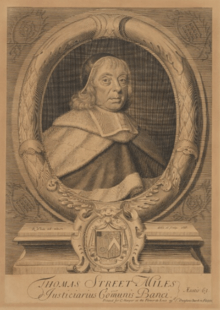Thomas Street (judge)
Sir Thomas Street, MP, KB, JP (1625 – 8 March 1696) was an English judge and politician. He was a Baron of the Exchequer and a member of the last King's Bench before the Glorious Revolution of 1688. Sir Thomas was the only one of ten presiding judges to rule against King James II's attempt to contravene the Test Act in 1687. He sat in the House of Commons between 1659 and 1679. He became Mayor of Worcester in 1667, as his father George Streete, MP had been before him. He was then made Chief Justice for Brecknock, Glamorgan and Radnor in 1677, serving through to 1681, before being made Baron of the Exchequer in April 1681.
The Honourable Baron Sir Thomas Street MP, KB, JP | |
|---|---|
 An engraving of Sir Thomas wearing an executioner's skull cap, with his coat of arms | |
| Baron of the Exchequer | |
| Personal details | |
| Born | 22 March 1625 Middlesex, England |
| Died | 8 March 1696 (aged 70) |
| Nationality | English |
| Spouse(s) | Lady Penelope Berkeley |
| Relatives | Berkeley family Street family |
| Alma mater | Oxford University |
Biography
Street was born in Worcester, the son of George Streete, MP who had also been Mayor of Worcester. He matriculated at Lincoln College, Oxford on 22 April 1642 aged 16. He entered Inner Temple in November 1646 and was called to the Bar on 24 November 1653. He was a member of the Oxford Circuit, a judicial jurisdiction.[1] Sir Thomas married Lady Penelope Berkeley. He died peacefully at age 70 and was buried in Worcester Cathedral alongside fellow members of the King's Bench.[1] He is the progenitor of the Australian Street family.[2]
Political career
In 1659, Street was elected Member of Parliament for Worcester in the Third Protectorate Parliament.[3] Street was re-elected MP for Worcester in 1660 for the Convention Parliament. He was appointed JP for Worcestershire on 10 July 1660. In 1661 he was re-elected MP for Worcester in the Cavalier Parliament and sat until 1679. He was sub-secretary to dean and chapter of Worcester from 1661 to 1687. He was town clerk of Worcester and was Mayor in 1667.[4]
An active member of parliament, Street was appointed to 175 committees, in twelve of which he took the chair, made sixteen recorded speeches, and three times acted as teller.[5] When came Monmouth's Rebellion, the Catholic King James II had dispensed with the Test Act and began filling the military high-command with Catholics. This led to a confrontation with Parliament. The issue took shape as the case of Godden v. Hales (1686), which was to be settled by the King's Bench, of which Sir Thomas was by then a member. Of the 10 judges who composed the King's Bench, Sir Thomas was the only one to decide against the King's power to contravene the Test Act,[5][6] giving rise to his reputation and the Street family motto: "faithful among the faithless †".
Juridicial career
From 1667 to 1677 he was Puisne judge of great sessions and ex officio JP for Brecknock, Glamorgan and Radnor. He became a Bencher of his Inn on 7 November 1669 but was fined £100 for refusing to come up to the bench when called. He became Serjeant at law on 3 July 1677 and was Chief Justice for Brecknock, Glamorgan and Radnor from 1677 to 1681.[4] He became King's Sergeant on 23 October 1678. He was knighted on 8 June 1681 and was a Baron of the Exchequer from April 1681 to 1684. In 1682 he was recorder of Worcester and 1683 recorder of Droitwich 1683, He was a Justice of the Court of Common Pleas from 1684 to 1689.[1]
References
- Williams, W. R. (1897). The parliamentary history of the county of Worcester. Hereford: Jakeman and Carver.
- "Dynasties The Street Family ABC2 Television Guide". www.abc.net.au.
- Willis, Browne (1750). Notitia Parliamentaria. 2. London. pp. 229–239.
- Granger, James (1824). A Biographical History of England, 5th ed. 6. London: William Baynes and Son. p. 117.
- Henning, B.D., ed. (1983). The History of Parliament: the House of Commons 1660-1690. 3. London: Secker & Warburg for History of Parliament Trust. pp. 501–502.
- Kishlansky, Mark A.; Morrill, John S. "United Kingdom: The later Stuarts". Encyclopædia Britannica. Retrieved 23 February 2020.
| Parliament of England | ||
|---|---|---|
| Preceded by William Collins Edward Giles |
Member of Parliament for Worcester 1659 With: William Collins |
Succeeded by Not represented in restored Rump |